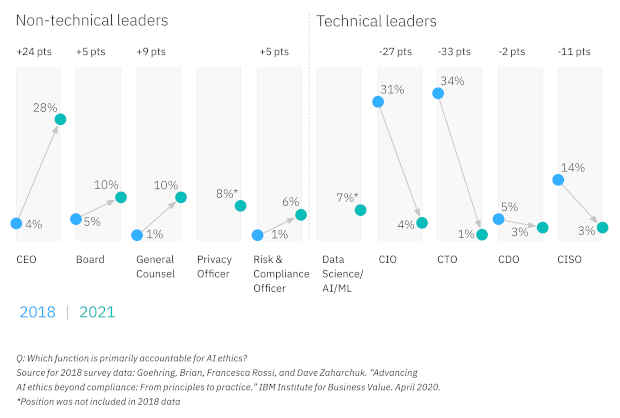IBM Releases Enterprise Guide to Use AI Responsibly
A new IBM (NYSE: IBM) Institute for Business Value (IBV) study revealed a radical shift in the roles responsible for leading and upholding AI (artificial intelligence) ethics at an organization.
When asked which function is primarily accountable for AI ethics, 80% of respondents pointed to a non-technical executive, such as a CEO, as the primary “champion” for AI ethics, a sharp uptick from 15% in 2018.
The global study also indicates that despite a strong imperative for advancing trustworthy AI, including better performance compared to peers in sustainability, social responsibility, and diversity and inclusion, there remains a gap between leaders’ intention and meaningful actions. The study found:
Business executives are now seen as the driving force in AI ethics
CEOs (28%) – but also Board members (10%), General Counsels (10%), Privacy Officers (8%), and Risk & Compliance Officers (6%) are viewed as being most accountable for AI ethics by those surveyed.
While 66% of respondents cite the CEO or other C-level executive as having a strong influence on their organization’s ethics strategy, more than half cite board directives (58%) and the shareholder community (53%).
Building trustworthy AI is perceived as a strategic differentiator and organizations are beginning to implement AI ethics mechanisms.
More than three-quarters of business leaders surveyed this year agree AI ethics is important to their organizations, up from about 50% in 2018.
At the same time, 75% of respondents believe ethics is a source of competitive differentiation, and more than 67% of respondents that view AI and AI ethics as important indicate their organizations outperform their peers in sustainability, social responsibility, and diversity and inclusion.
Many companies have started making strides. In fact, more than half of respondents say their organizations have taken steps to embed AI ethics into their existing approach to business ethics.
More than 45% of respondents say their organizations have created AI-specific ethics mechanisms, such as an AI project risk assessment framework and auditing/review process.
The IBV study, “AI ethics in action: An enterprise guide to progressing trustworthy AI,” surveyed 1,200 executives in 22 countries across 22 industries to understand where executives stand on the importance of AI ethics and how organizations are operationalizing it. The study was conducted in cooperation with Oxford Economics in 2021.















